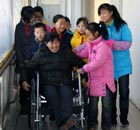Web Exclusive
Nearly half of CPPCC proposals focus on housing
By Ren Jie (Chinadaily.com.cn)
Updated: 2010-03-03 16:26
 |
Large Medium Small |
Nearly half the proposals to the CPPCC, the annual meeting of China's top advisory body, were related to the real estate market, with the top topics being low-income housing, property taxes and mortgage loans, the China Securities Journal reported on Wednesday.
CPPCC member Li Daokui, director of the Center for China in the World Economy, Tsinghua University, proposed the government should learn from Singapore and Hong Kong and build a large number of low-rent homes, which with a stable rental income will allow them to get financing and in turn build more homes.
CPPCC member Yu Lian, CEO of China City Construction Holding Group Co, said 30 to 40 percent of residents can solve their housing problems through low-rent houses.
CPPCC member Guo Songhai, professor at Shandong Economic University, said governments should encourage branded businesses to build the moderate and low-priced housing, reinforce the construction of low-income houses and provide preferential terms for medium and small-sized apartments.
Guo also proposed implementing different interest rates on mortgage loans. He suggested banks provide favorable interest rates for home buyers for residence, but control loans for investors and speculators.
In addition, some members proposed curbing home prices through levying property taxes. CPPCC member Yan Qingmin, director of the Shanghai banking regulatory bureau, proposed a crackdown on land hoarding by levying land value-added taxes. He also said levying property taxes would be effective in curbing housing prices, but when and how to push forward on that plan should depend on the maturity level of China’s real estate market.
Yan also said the scrutiny on loans to real estate companies will be much stricter in 2010. The regulators are set to raise the qualification requirements for property developers.















